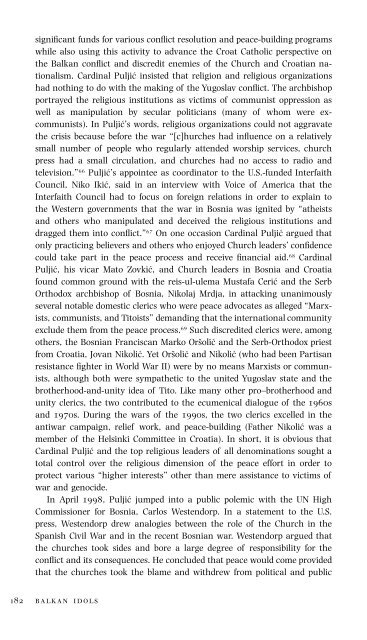Balkan Idols: Religion and Nationalism in Yugoslav States
Balkan Idols: Religion and Nationalism in Yugoslav States
Balkan Idols: Religion and Nationalism in Yugoslav States
You also want an ePaper? Increase the reach of your titles
YUMPU automatically turns print PDFs into web optimized ePapers that Google loves.
significant funds for various conflict resolution <strong>and</strong> peace-build<strong>in</strong>g programs<br />
while also us<strong>in</strong>g this activity to advance the Croat Catholic perspective on<br />
the <strong>Balkan</strong> conflict <strong>and</strong> discredit enemies of the Church <strong>and</strong> Croatian nationalism.<br />
Card<strong>in</strong>al Puljić <strong>in</strong>sisted that religion <strong>and</strong> religious organizations<br />
had noth<strong>in</strong>g to do with the mak<strong>in</strong>g of the <strong>Yugoslav</strong> conflict. The archbishop<br />
portrayed the religious <strong>in</strong>stitutions as victims of communist oppression as<br />
well as manipulation by secular politicians (many of whom were excommunists).<br />
In Puljić’s words, religious organizations could not aggravate<br />
the crisis because before the war “[c]hurches had <strong>in</strong>fluence on a relatively<br />
small number of people who regularly attended worship services, church<br />
press had a small circulation, <strong>and</strong> churches had no access to radio <strong>and</strong><br />
television.” 66 Puljić’s appo<strong>in</strong>tee as coord<strong>in</strong>ator to the U.S.-funded Interfaith<br />
Council, Niko Ikić, said <strong>in</strong> an <strong>in</strong>terview with Voice of America that the<br />
Interfaith Council had to focus on foreign relations <strong>in</strong> order to expla<strong>in</strong> to<br />
the Western governments that the war <strong>in</strong> Bosnia was ignited by “atheists<br />
<strong>and</strong> others who manipulated <strong>and</strong> deceived the religious <strong>in</strong>stitutions <strong>and</strong><br />
dragged them <strong>in</strong>to conflict.” 67 On one occasion Card<strong>in</strong>al Puljić argued that<br />
only practic<strong>in</strong>g believers <strong>and</strong> others who enjoyed Church leaders’ confidence<br />
could take part <strong>in</strong> the peace process <strong>and</strong> receive f<strong>in</strong>ancial aid. 68 Card<strong>in</strong>al<br />
Puljić, his vicar Mato Zovkić, <strong>and</strong> Church leaders <strong>in</strong> Bosnia <strong>and</strong> Croatia<br />
found common ground with the reis-ul-ulema Mustafa Cerić <strong>and</strong> the Serb<br />
Orthodox archbishop of Bosnia, Nikolaj Mrdja, <strong>in</strong> attack<strong>in</strong>g unanimously<br />
several notable domestic clerics who were peace advocates as alleged “Marxists,<br />
communists, <strong>and</strong> Titoists” dem<strong>and</strong><strong>in</strong>g that the <strong>in</strong>ternational community<br />
exclude them from the peace process. 69 Such discredited clerics were, among<br />
others, the Bosnian Franciscan Marko Orsˇolić <strong>and</strong> the Serb-Orthodox priest<br />
from Croatia, Jovan Nikolić. Yet Orsˇolić <strong>and</strong> Nikolić (who had been Partisan<br />
resistance fighter <strong>in</strong> World War II) were by no means Marxists or communists,<br />
although both were sympathetic to the united <strong>Yugoslav</strong> state <strong>and</strong> the<br />
brotherhood-<strong>and</strong>-unity idea of Tito. Like many other pro–brotherhood <strong>and</strong><br />
unity clerics, the two contributed to the ecumenical dialogue of the 1960s<br />
<strong>and</strong> 1970s. Dur<strong>in</strong>g the wars of the 1990s, the two clerics excelled <strong>in</strong> the<br />
antiwar campaign, relief work, <strong>and</strong> peace-build<strong>in</strong>g (Father Nikolić was a<br />
member of the Hels<strong>in</strong>ki Committee <strong>in</strong> Croatia). In short, it is obvious that<br />
Card<strong>in</strong>al Puljić <strong>and</strong> the top religious leaders of all denom<strong>in</strong>ations sought a<br />
total control over the religious dimension of the peace effort <strong>in</strong> order to<br />
protect various “higher <strong>in</strong>terests” other than mere assistance to victims of<br />
war <strong>and</strong> genocide.<br />
In April 1998, Puljić jumped <strong>in</strong>to a public polemic with the UN High<br />
Commissioner for Bosnia, Carlos Westendorp. In a statement to the U.S.<br />
press, Westendorp drew analogies between the role of the Church <strong>in</strong> the<br />
Spanish Civil War <strong>and</strong> <strong>in</strong> the recent Bosnian war. Westendorp argued that<br />
the churches took sides <strong>and</strong> bore a large degree of responsibility for the<br />
conflict <strong>and</strong> its consequences. He concluded that peace would come provided<br />
that the churches took the blame <strong>and</strong> withdrew from political <strong>and</strong> public<br />
182balkan idols


